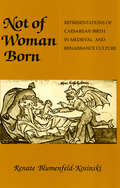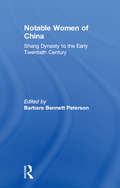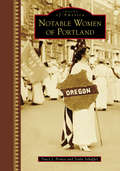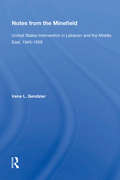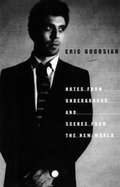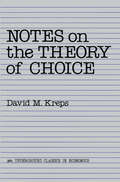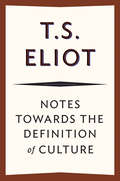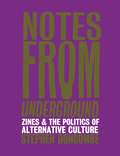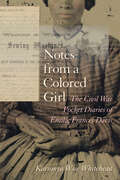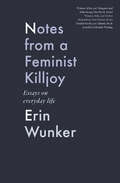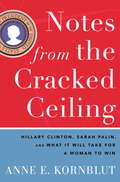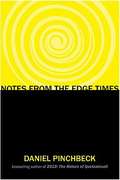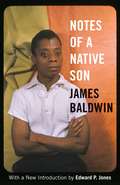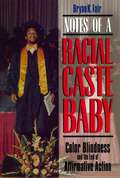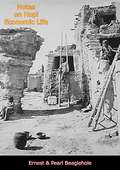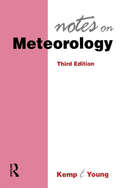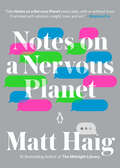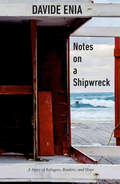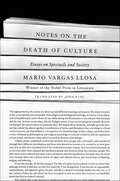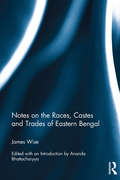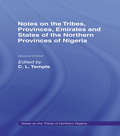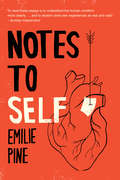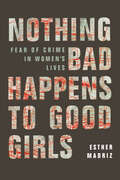- Table View
- List View
Not of Woman Born: Representations of Caesarean Birth in Medieval and Renaissance Culture
by Renate Blumenfeld-Kosinski"Not of woman born, the Fortunate, the Unborn"—the terms designating those born by Caesarean section in medieval and Renaissance Europe were mysterious and ambiguous. Examining representations of Caesarean birth in legend and art and tracing its history in medical writing, Renate Blumenfeld-Kosinski addresses the web of religious, ethical, and cultural questions concerning abdominal delivery in the Middle Ages and the Renaissance. Not of Woman Born increases our understanding of the history of the medical profession, of medical iconography, and of ideas surrounding "unnatural" childbirth.Blumenfeld-Kosinski compares texts and visual images in order to trace the evolution of Caesarean birth as it was perceived by the main actors involved—pregnant women, medical practitioners, and artistic or literary interpreters. Bringing together medical treatises and texts as well as hitherto unexplored primary sources such as manuscript illuminations, she provides a fresh perspective on attitudes toward pregnancy and birth in the Middle Ages and the Renaissance; the meaning and consequences of medieval medicine for women as both patients and practitioners, and the professionalization of medicine. She discusses writings on Caesarean birth from the twelfth and thirteenth centuries, when Church Councils ordered midwives to perform the operation if a mother died during childbirth in order that the child might be baptized; to the fourteenth century, when the first medical text, Bernard of Gordon's Lilium medicinae, mentioned the operation; up to the gradual replacement of midwives by male surgeons in the fifteenth and sixteenth centuries. Not of Woman Born offers the first close analysis of Frarnois Rousset's 1581 treatise on the operation as an example of sixteenth-century medical discourse. It also considers the ambiguous nature of Caesarean birth, drawing on accounts of such miraculous examples as the birth of the Antichrist. An appendix reviews the complex etymological history of the term "Caesarean section."Richly interdisciplinary, Not of Woman Born will enliven discussions of the controversial issues surrounding Caesarean delivery today. Medical, social, and cultural historians interested in the Middle Ages and the Renaissance, historians, literary scholars, midwives, obstetricians, nurses, and others concerned with women's history will want to read it.
Not the Marrying Kind: A Feminist Critique of Same-Sex Marriage (Palgrave Socio-Legal Studies)
by Nicola BarkerNot the Marrying Kind is a new and comprehensive exploration of the contemporary same-sex marriage debates in several jurisdictions including Australia, Canada, South Africa, the United Kingdom and the United States. It departs from much of the existing scholarship on same-sex marriage, which argues either for or against marriage for same-sex couples. Instead, this book begins from a critical analysis of the institution of marriage itself (as well as separate forms of relationship recognition, such as civil partnership, PaCS, domestic partnership) and asks whether and how feminist critiques of marriage might be applied specifically to same-sex marriage. In doing this, the author combines the theories of second wave feminism with insights from contemporary queer theory.
Not the Way It Really Was: Constructing the Tolai Past (Pacific Islands Monograph Series, No. #10)
by Klaus NeumannThe Tolai are a well-known people through an extensive body of ethnographic literature.
Notable Women of China: Shang Dynasty to the Early Twentieth Century
by Barbara Bennett PetersonThe collaborative effort of nearly 100 China scholars from around the world, this unique one-volume reference provides 89 in-depth biographies of important Chinese women from the fifth century B.C.E to the early twentieth century.
Notable Women of Portland
by Tracy J. Prince Zadie J. SchafferThe story of Portland, Oregon, like much of history, has usually been told with a focus on male leaders. This book offers a reframing of Portland’s history. Many women made their mark and radically changed the Oregon frontier, including Native Americans Polly Johnson and Josette Nouette; pioneers Minerva Carter and Charlotte Terwilliger; doctors Marie Equi, Mary Priscilla Avery Sawtelle, and Bethina Owens-Adair; artists Eliza Barchus and Lily E. White; suffragists Abigail Scott Duniway, Hattie Redmond, and Eva Emery Dye; lawyer Mary Gysin Leonard; Air Force pilot Hazel Ying Lee; politicians Barbara Roberts and Margaret Carter; and authors Frances Fuller Victor, Beverly Cleary, Beatrice Morrow Cannady, Ursula Le Guin, and Jean Auel. These women, along with groups of women such as “Wendy the Welders,” made Portland what it is today.
Notes From The Minefield: United States Intervention In Lebanon And The Middle East, 1945-1958 (History And Society Of The Modern Middle East Ser.)
by Irene L GendzierIrene Gendzier's critically acclaimed, wide-reaching analysis of post-World War II U.S. policy in Lebanon posits that the politics of oil and pipelines figured far more significantly in U.S. relations with Lebanon than previously believed. In 1958 the United States sent thousands of troops to shore up the Lebanese regime in the face of domestic opp
Notes From Underground
by Eric BogosianIncludes Bogosian's Notes from Underground, the "diary," of an increasingly disturbed and disturbing urban recluse, together with Scenes from the New World, an early dramatic work.
Notes On The Theory Of Choice
by David KrepsIn this book, Professor Kreps presents a first course on the basic models of choice theory that underlie much of economic theory. This course, taught for several years at the Graduate School of Business, Stanford University, gives the student an introduction to the axiomatic method of economic analysis, without placing too heavy a demand on mathematical sophistication.The course begins with the basics of choice and revealed preference theory and then discusses numerical representations of ordinal preference. Models with uncertainty come next: First is von Neumann?Morgenstern utility, and then choice under uncertainty with subjective uncertainty, using the formulation of Anscombe and Aumann, and then sketching the development of Savage's classic theory. Finally, the course delves into a number of special topics, including de Finetti's theorem, modeling choice on a part of a larger problem, dynamic choice, and the empirical evidence against the classic models.
Notes Towards the Definition of Culture: Notas Para La Definición De La Cultura (Raíces De Europa Ser.)
by T. S. EliotThis critique of modern society argues that culture must be organic, and cannot be planned or imposed. The word culture has been widely and erroneously employed in political, educational, and journalistic contexts. In helping to define a word so greatly misused, T. S. Eliot contradicts many of our popular assumptions about culture, reminding us that it is not the possession of any one class but of a whole society—and yet its preservation may depend on the continuance of a class system, and that a &“classless&” society may be a society in which culture has ceased to exist. Surveying the post–World War II world, Eliot finds evidence of decay in cultural standards in every department of human activity, and expects the phenomenon to continue. He suggests that culture and religion have a common root—and if one decays, the other may die too. In observing the superpowers of his day and the course of recent history, he reminds us that &“the Russians have been the first modern people to practise the political direction of culture consciously, and to attack at every point the culture of any people whom they wish to dominate.&” The appendix includes Eliot&’s broadcasts to Europe, ending with a plea to preserve the legacy of Greece, Rome, and Israel, and Europe&’s legacy throughout the last two thousand years. &“Behind the urbanity, the modesty, the mere good manners of Mr. Eliot&’s exposition, one cannot mistake the force and significance of what he has to say, or ignore that it constitutes a fundamental attack on most of our assumptions on the subject.&” —The Spectator
Notes from Underground
by Stephen DuncombeMuch history and theory is uncovered here in the first comprehensive study of zine publishing. From their origins in early 20th century science fiction cults, their more proximate roots in '60s counter-culture and their rapid proliferation in the wake of punk rock, Stephen Duncombe pays full due to the political importance of zines as a vital network of popular culture. He also analyzes how zines measure up to their utopian and escapist outlook in achieving fundamental social change. Packed with extracts and illustrations, he provides a useful overview of the contemporary underground in all its splendor and misery.
Notes from a Colored Girl: The Civil War Pocket Diaries of Emilie Frances Davis (Women's Diaries and Letters of the South)
by Karsonya Wise WhiteheadThis historical biography provides a scholarly analysis of the personal diaries of a young, freeborn mulatto woman during the Civil War years.In Notes from a Colored Girl, Karsonya Wise Whitehead examines the life and experiences of Emilie Frances Davis through a close reading of three pocket diaries she kept from 1863 to 1865. Whitehead explores Davis’s worldviews and politics, her perceptions of both public and private events, her personal relationships, and her place in Philadelphia’s free black community in the nineteenth century. The book also includes a six-chapter historical reconstruction of Davis’s life.While Davis’s entries provide brief, daily snapshots of her life, Whitehead interprets them in ways that illuminate nineteenth-century black American women’s experiences. Whitehead’s contribution of edited text and original narrative fills a void in scholarly documentation of women who dwelled in spaces between white elites, black entrepreneurs, and urban dwellers of every race and class.Drawing on scholarly traditions from history, literature, feminist studies, and sociolinguistics, Whitehead investigates Davis’s diary both as a complete literary artifact and in terms of her specific daily entries. With few primary sources written by black women during this time in history, Davis’s diary is a rare and extraordinarily valuable historical artifact.
Notes from a Feminist Killjoy: Essays on Everyday Life
by Erin WunkerErin Wunker is a feminist killjoy, and she thinks you should be one, too. Following in the tradition of Sara Ahmed (the originator of the concept of the "feminist killjoy"), Wunker brings memoir, theory, literary criticism, pop culture, and feminist thinking together in this collection of essays that take up Ahmed's project as a multi-faceted lens through which to read the world from a feminist point of view. Neither totemic nor complete, the non-fiction essays that make up Notes from a Feminist Killjoy: Essays on Everyday Life attempt to think publicly about why we need feminism, and especially why we need the figure of the feminist killjoy, now. From the complicated practices of being a mother and a feminist, to building friendship amongst women as a community-building and -sustaining project, to writing that addresses rape culture from the Canadian context and beyond, Notes from a Feminist Killjoy: Essays on Everyday Life invites the reader into a conversation about gender, feminism, and living in our inequitable world.
Notes from the Cracked Ceiling: Hillary Clinton, Sarah Palin, and What It Will Take for a Woman to Win
by Anne E. KornblutIn the presidential election of 2008 America seemed ready to elevate a woman to the presidency or vice presidency and-with Hillary Clinton and Sarah Palin-was on the verge of actually doing so. Words like inevitable and phenomenon were in the air and the political and cultural stars seemed to be aligned. Why didn't it happen? What will it take to make it happen soon? In a probing analysis sure to ignite controversy, acclaimed White House correspondent Anne Kornblut argues that the optimists are blind to formidable obstacles that still stand in the way of any woman who aims for America's highest political offices. And she makes clear exactly which strategies and common assumptions will need to change if a woman intends to break through the "highest, hardest glass ceiling" of all. Delving deep inside the Clinton and Palin campaigns, Kornblut reveals: * the strategists' mishandling of their candidates as women by failing to strike the right balance between femininity and toughness * Clinton's weathering of a series of stinging gender-based attacks, until accusations of "pimping out" her daughter, Chelsea, finally brought her to tears * that Barack Obama was celebrated for his "historic" win in Iowa, even though it was not the first time an African American had won a caucus, but few noticed when Clinton became the first woman to win a primary in New Hampshire * that Palin was chosen solely by men, none of whom had experience in running women for office. Drawing from exclusive interviews with prominent women in both parties, Kornblut pinpoints where politically ambitious American women have gone wrong and what it will take to put them on track to the ultimate prize: the presidency. Former secretary of state Condoleezza Rice asserts: "We crossed the bar on African Americans some time ago. I'm not quite sure we've crossed it on women. " House Speaker Nancy Pelosi remarks on the "suit of armor" women must don to survive the sexism and viciousness of politics. Homeland Security Director Janet Napolitano confronts the false rumors that she is a lesbian and reveals what an invigorating "kick in the pants" it is to be in politics. And California gubernatorial candidate Meg Whitman, the former head of eBay, compares politics to business: "It feels to me, thus far, as less of a meritocracy and more of a popularity contest. More of a little bit of an old boys' club. " Kornblut identifies the surprising realities of gender politics, such as the harsh treatment female candidates often receive from women voters, the gap between the United States and other countries when it comes to the electability of women, the "mommy penalty" that handicaps women candidates with young children, and the special appeal that women with law enforcement backgrounds have with voters. Notes from the Cracked Ceiling reveals that the highly touted new era of gender-equal politics never got as far as was commonly perceived and is now in full retreat. It is essential reading for anyone who cares about politics and the limits for women that persist.
Notes from the Edge Times
by Daniel PinchbeckIn this unsparing tour of the perils and promises of the current era, visionary author Daniel Pinchbeck helps us understand that we don't need to wait for the dawning of the next age to radically change our perspectives. In the years since his pioneering work 2012, Daniel Pinchbeck has touched a legion of readers hungry for insight and guidance about new ways of living amid the crises of the current moment. Notes from the Edge Times collects Pinchbeck's most penetrating recent columns, articles, and essays that amount to an extraordinary mosaic view of the hopes, nightmares, and signs of breakthrough that mark our present era. Pinchbeck examines the current economic collapse (an event he had foreseen by many months), radical political and ecological alternatives, the uses of psychedelics for spiritual insight, the revival of the sexual revolution, unexplained phenomena such as crop circles and the Norway spiral, the imminent (and often-misunderstood) question of 2012, and what it means to be an artist in a time of radical change. Pinchbeck's virtuosity as a social critic, on full display in these pieces, is his ability to illuminate real and serious questions within unconventional topics that most literary intellects are unwilling to touch, from secret weapons systems to extrasensory abilities to the intelligence of plant life. In Notes from the Edge Times, Pinchbeck does more than critique present- day questions and conflicts; he provides fresh ideas for living more consciously now, and for constructing our own more enlightened futures, even as the world around us faces profound environmental, social, and spiritual challenges .
Notes of a Native Son
by James Baldwin Edward P. JonesA new edition published on the twenty-fifth anniversary of Baldwin's death, including a new introduction by an important contemporary writer Since its original publication in 1955, this first nonfiction collection of essays by James Baldwin remains an American classic. His impassioned essays on life in Harlem, the protest novel, movies, and African Americans abroad are as powerful today as when they were first written. "A straight-from-the-shoulder writer, writing about the troubled problems of this troubled earth with an illuminating intensity." --Langston Hughes, The New York Times Book Review "Written with bitter clarity and uncommon grace." --TimeFrom the Trade Paperback edition.
Notes of a Racial Caste Baby: Color Blindness and the End of Affirmative Action (Critical America #25)
by Bryan K. FairThe Constitution of the United States, writes Bryan Fair, was a series of compromises between white male propertyholders: Southern planters and Northern merchants. At the heart of their deals was a clear race-conscious intent to place the interests of whites above those of blacks. In this provocative and important book, Fair, the eighth of ten children born to a single mother on public assistance in an Ohio ghetto, combines two histories--America's and his own- -to offer a compelling defense of affirmative action. How can it be, Fair asks, that, after hundreds of years of racial apartheid during which whites were granted 100% quotas to almost all professions, we have now convinced ourselves that, after a few decades of remedial affirmative action, the playing field is now level? Centuries of racial caste, he argues, cannot be swept aside in a few short years. Fair ambitiously surveys the most common arguments for and against affirmative action. He argues that we must distinguish between America in the pre-Civil Rights Movement era--when the law of the land was explicitly anti-black--and today's affirmative action policies--which are decidedly not anti- white. He concludes that the only just and effective way in which to account for America's racial past and to negotiate current racial quagmires is to embrace a remedial affirmative action that relies neither on quotas nor fiery rhetoric, but one which takes race into account alongside other pertinent factors. Championing the model of diversity on which the United States was purportedly founded, Fair serves up a personal and persuasive account of why race-conscious policies are the most effective way to end de facto segregation and eliminate racial caste. Table of Contents A Note to the Reader Acknowledgments Preface: Telling Stories Recasting Remedies as Diseases Color-Blind Justice The Design of This Book Pt. 1. A Personal Narrative Not White Enough Dee Black Columbus Racial Poverty Man-Child Colored Matters Coded Schools Busing Going Home Equal Opportunity The Character of Color Diversity as One Factor The Deception of Color Blindness Pt. 2. White Privilege and Black Despair: The Origins of Racial Caste in America The Declaration of Inferiority Marginal Americans Inventing American Slavery The Road to Constitutional Caste Losing Second-Class Citizenship Reconstruction and Sacrifice Separate and Unequal The Color Line Critiquing Color Blindness Pt. 3. The Constitutionality of Remedial Affirmative Action The Origins of Remedial Affirmative Action The Court of Last Resort The Invention of Reverse Discrimination The Politics of Affirmative Action: Myth or Reality? Racial Realism Eliminating Caste Afterword Notes Index
Notes on Hopi Economic Life: Yale University Publications In Anthropology, No. 15 (Yale University Publications In Anthropology #No. 15)
by Ernest Beaglehole Pearl BeagleholeThis source is a general study of Hopi economic life based on the study of two Second Mesa villages — Mishongnovi and Shipaulovi. The field work was done by the author in the summers of 1932 and 1934. In addition to the detailed data on various aspects of the Hopi economy (e. g., food gathering, agriculture, etc.), there is a great deal of other information to be found here relevant to household organization, kin and clan, property, foods and food preparation, crafts, house building, labor organization, and the distribution of wealth through ceremony and exchange.
Notes on Meterology
by Young Richard Kemp KempPart of the Kemp and Young series, this book provides a concise introduction to meteorology. Information is presented using diagrams, illustrations and worked examples. Mathematics is kept to a necessary minimum and there is a comprehensive index to aid quick reference. Notes on Meteorology is suitable for First Officer or Master Marine certification exams, those new to sea faring, and those whose practical experience is limited to narrow areas and wish to expand their knowledge.
Notes on a Nervous Planet
by Matt HaigA follow-up to Matt Haig's internationally bestselling memoir, Reasons to Stay Alive, a broader look at how modern life feeds our anxiety, and how to live a better life.The societies we live in are increasingly making our minds ill, making it feel as though the way we live is engineered to make us unhappy. When Matt Haig developed panic disorder, anxiety, and depression as an adult, it took him a long time to work out the ways the external world could impact his mental health in both positive and negative ways. Notes on a Nervous Planet collects his observations, taking a look at how the various social, commercial and technological "advancements" that have created the world we now live in can actually hinder our happiness. Haig examines everything from broader phenomena like inequality, social media, and the news; to things closer to our daily lives, like how we sleep, how we exercise, and even the distinction we draw between our minds and our bodies.
Notes on a Shipwreck: A Story of Refugees, Borders, and Hope
by Davide EniaA moving firsthand account of migrant landings on the island of Lampedusa that gives voice to refugees, locals, and volunteers while also exploring a deeply personal father-son relationship. On the island of Lampedusa, the southernmost part of Italy, between Africa and Europe, Davide Enia looks in the faces of those who arrive and those who wait, and tells the story of an individual and collective shipwreck. On one side, a multitude in motion, crossing entire nations and then the Mediterranean Sea under conditions beyond any imagination. On the other, a handful of men and women on the border of an era and a continent, trying to welcome the newcomers. In the middle is the author himself, telling of what actually happens at sea and on land, and the failure of words in the attempt to understand the present paradoxes.Enia reveals the emotional consequences of this touching and disconcerting reality, especially in his relationship with his father, a recently retired doctor who agrees to travel with him to Lampedusa. Witnessing together the public pain of those who land and those who save them from death, alongside the private pain of his uncle's illness, pushes them to reinvent their relationship, to forge a new and unprecedented dialogue that replaces the silences of the past.
Notes on the Death of Culture: Essays on Spectacle and Society
by Mario Vargas LlosaThe Peruvian Nobel laureate presents a collection of essays on the decline of intellectual life in the age of media spectacle.In the past, culture was a kind of vital consciousness that constantly rejuvenated and revivified everyday reality. Now it is largely a mechanism of distraction and entertainment. Notes on the Death of Culture is an examination and indictment of this transformation—penned by Mario Vargas Llosa, who is not only one of our finest novelists but one of the keenest social critics.Taking his cues from T.S. Eliot—whose essay “Notes Toward a Definition of Culture” is a touchstone precisely because the culture Eliot aimed to describe has since vanished—Vargas Llosa traces a decline whose ill effects have only just begun. He mourns, in particular, the figure of the intellectual: for most of the twentieth century, men and women of letters drove political, aesthetic, and moral conversations; today they have all but disappeared from public debate.But Vargas Llosa stubbornly refuses to fade into the background. A necessary gadfly, the Nobel laureate Vargas Llosa, here vividly translated by John King, provides a tough but essential critique of our time and culture.
Notes on the Races, Castes and Trades of Eastern Bengal
by Ananda Bhattacharyya James WiseJames Wise was Civil Surgeon of Dacca for ten years and in that capacity had great opportunities of observing the social life of the people of Bengal. During his stay there he collected material for a book which he published in 1883 after his retirement under the title Notes on the Races, Castes, and Trades of Eastern Bengal. It was printed by ‘Her Majestry’s printer Harrison and Sons’, St. Martin Lane, London. Only 12 copies were originally printed. A doctor by profession and an anthropologist by vocation, the erudition and companionship of Wise even made the visit of the famous archaeologist Alexander Cunningham to Sonargaon and Vikrampur fruitful. The ‘Wiseghat’ on the bank of river Buri Ganga was named after him. James Wise died in July 1885. The present volume is a reprint of the above noted book on colonial Bengal by James Wise. It is divided into five parts, viz, ‘Muhammadan’, ‘Religious Sects of the Hindus’, ‘Hindu Castes and Aboriginal Races’, ‘Armenians’ and ‘Portuguese in Eastern Bengal’. The present edition has been reset and contains a comprehensive introduction by the editor. It places the volume in context and explains the relevance of the work for the present times. The volume will be invaluable for scholars of colonial, cultural and anthropological history of Bengal.
Notes on the Tribes, Provinces, Emirates and States of the Northern Provinces of Nigeria: Compiled From Official Reports (classic Reprint)
by O. TempleFirst Published in 1965. The compilation contained in the following book have been made with the object of rendering available to those interested, in a small compass, at all events some of the immense stores of facts concerning the natives of the Northern Provinces of Nigeria assiduously collected by the political staff. This information is contained scattered through innumerable reports, assessment reports, annual and monthly reports, and official letters, etc., which are kept at the Secretariat and the Provincial Headquarters, and is not readily accessible, even to those who are stationed at Headquarters and are able to command the Secretariat files.
Notes to Self: Essays
by Emilie PineThe international sensation that illuminates the experiences women are supposed to hide—from addiction, anger, sexual assault, and infertility to joy, sensuality, and love.WINNER OF THE AN POST IRISH BOOK OF THE YEAR • “Emilie Pine’s voice is razor-sharp and raw; her story is utterly original yet as familiar as my own breath.”—Glennon Doyle, #1 New York Times bestselling author of Love WarriorIn this dazzling debut, Emilie Pine speaks to the events that have marked her life—those emotional disruptions for which our society has no adequate language, at once bittersweet, clandestine, and ordinary. She writes with radical honesty on the unspeakable grief of infertility, on caring for an alcoholic parent, on taboos around female bodies and female pain, on sexual violence and violence against the self. This is the story of one woman, and of all women. Devastating, poignant, and wise—and joyful against the odds—Notes to Self is an unforgettable exploration of what it feels like to be alive, and a daring act of rebellion against a society that is more comfortable with women’s silence.Praise for Notes to Self“Notes to Self begins as a deceptively simple catalogue of the injustices of modern female life and slyly emerges as a screaming treatise on just what it means to make your own rules, turning the hand you’ve been dealt into the coolest game in town. Emilie Pine is like your best friend—if your best friend was so sharp she drew blood.”—Lena Dunham, #1 New York Times bestselling author of Not That Kind of Girl“To read these essays is to understand the human condition more clearly, to reassess one’s place in the world, and to reclaim one’s own experiences as real and valid.”—Sunday Independent “Harrowing, clear-eyed . . . Everyone should consider [this] priority reading.”—Sunday Business Post “Incredible and insightful—an absolute must-read.”—The Skinny “Agonizing, uncompromising, starkly brilliant. . . . [A] short, gleamingly instructive book, both memoir and psychological exploration—a platform for that insistent internal voice that almost any woman . . . wishes they had ignored.”—Financial Times “Do not read this book in public. It will make you cry.”—Anne Enright
Nothing Bad Happens to Good Girls: Fear of Crime in Women's Lives
by Esther Madriz"The possibility of being a victim of a crime is ever present on my mind; thinking about it as natural as breathing."—40-year-old womanThis is a compelling analysis of how women in the United States perceive the threat of crime in their everyday lives and how that perception controls their behavior. Esther Madriz draws on focus groups and in-depth interviews to show the damage that fear can wreak on women of different ages and socioeconomic backgrounds. Although anxiety about crime affects virtually every woman, Madriz shows that race and class position play a role in a woman's sense of vulnerability.Fear of crime has resulted in public demand for stronger and more repressive policies throughout the country. As funds for social programs are cut, Madriz points out, those for more prisons and police are on the increase. She also illustrates how media images of victims—"good" victims aren't culpable, "bad" victims invite trouble—and a tough political stance toward criminals are linked to a general climate of economic uncertainty and conservatism.Madriz argues that fear itself is a strong element in keeping women in subservient and self-limiting social positions. "Policing" themselves, they construct a restricted world that leads to positions of even greater subordination: Being a woman means being vulnerable. Considering the enormous attention given to crime today, including victims' rights and use of public funds, Madriz's informative study is especially timely.
